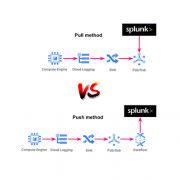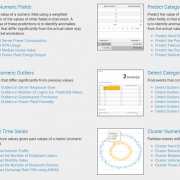MIT Sloan Conference Rundown – The Challenges of Big Data Analytics
 The 2018 MIT Sloan Conference wrapped up on February 4th in Boston, MA and for a big sports fan working in big data, it was great to see the number and variety of people in attendance. This blog post will outline some of the common big data analytics challenges encountered in sports, which represent many of the same challenges we see with our customers on a regular basis.
The 2018 MIT Sloan Conference wrapped up on February 4th in Boston, MA and for a big sports fan working in big data, it was great to see the number and variety of people in attendance. This blog post will outline some of the common big data analytics challenges encountered in sports, which represent many of the same challenges we see with our customers on a regular basis.
Managers of major sports franchises and fans alike once questioned the benefits that data analytics could provide, however, it is safe to say that the majority of these people have been won over. From event management, increasing the number of season ticket holders, improving player performance and preventing injury, people are trying to ‘Moneyball‘ anything and everything. A common theme which recurred throughout the 2-day event was, “everyone has a huge amount of data, but they are not sure what to do with it”. This challenge is not one that is unique to sports, but one we frequently encounter with our clients across all industry sectors. Let’s dive into some of these common data challenges faced by the sports world in a bit more detail.
Challenge: Educating End-Users
What kinds of information are being collected from Athletes? Sleep patterns, food consumption, heart rates, mood, etc. Things such as heart rate can be automatically collected, but other data points such as mood, require manual input from athletes. Therefore, it is important athletes know how to use technology (i.e. customized applications for mobile devices and wearables). The technology also needs to be easy to use. Without ease of use, the chance of athlete participation diminishes. However, Athletes are not the only end-users. Physicians and trainers will also need flexibility in how the data is visualized, along with validation of data accuracy since the health of athletes is at risk. Therefore, constant communication between developers and all types of end-users will be essential in order for data to be leveraged effectively.
One of the most important aspects of education, and a noticeable theme throughout the conference, was informing end-users how they will benefit from the data they provide. There is obviously a lot more room for growth in terms of technology and manual input methods take greater effort from users. Therefore, education is necessary to use the technology correctly. Not to mention privacy concerns from the athletes themselves who are giving up all the data for analysis. A particularly interesting concern came from CJ Anderson, running back for the Denver Broncos. CJ was concerned the information collected from him could be used against him during contract negotiations. If health concerns arise, which may otherwise have not been recognized, or he was behind in specific metrics compared to other athletes, would he be offered less lucrative contracts?
Challenge: Cleaning Dirty Data
Anyone who works with data is aware that it is often very messy, sometimes seemingly designed, with no type of structure in mind. This is no different in the sports industry, where scrubbing and cleaning data can take 80% of the time. This can be tedious and takes a deep understanding on the type of incoming data. Without the appropriate resources, this work cannot be completed internally and it should come as no surprise that the scrubbing process is one which sports organizations have begun to outsource. In comes the Kraft Analytics Group (KAGR). The Kraft Sports Group was founded in the early 2000s and provides a variety of services which include: data management, advanced analytics and strategic consulting. The Philadelphia 76ers leverage KAGR’s services to manage and visualize data on season ticket holders. This empowers the 76er’s sales team with information on how many games have been missed by a customer, where customers are sitting and metrics for sales people on when to re-engage customers for a better in-game experience. With this information the 76ers were able to break a team record for season tickets and are expected to sell out all their home games.
Challenge: Data Consolidation – Dealing with Greater Volumes and Different Types
With so many different technologies available and organizations with different requirements, the segregation of technologies increases costs and complexities of management. Managers and national athletic groups alike need technologies that can provide a single view of everything going on with marketing, fan engagement and the health of their athletes. There definitely is no shortage in the amount of data collected, but the data is dispersed and owned by different groups. There is a need for the data to come together, for consolidation and for standardized formats. This is something the Australian Institute of Sport (AIS) hopes to achieve. The AIS manages a network of athletes all throughout Australia and they are currently working to bring all of their athlete and sports related data together.
Along with ease of management and cost efficiencies, more data means more knowledge. The sharing and analytics of greater volumes of information and different types of information could lead to greater insights. Teams have started looking at psychological assessments and how these can be combined with physical metrics to not only help current players, but also to help teams draft better. Greater insights means more successes which will in turn lead to greater user participation and growth.
Challenge: Stats Can Be Deceiving
Armed with only limited resources, an important part of data analytics is determining what should even be collected? In one of the panel discussions, Jalen Rose discussed how the number of steals by a player in basketball can be deceiving. A high number of steals does not always indicate a player’s defensive competence. A failed steal attempt can lead to the collapse of a team’s defensive scheme. Outside of sports, machine data comes from everything 24/7. So, while some sports teams may collect 100 GB annually, large businesses can require petabyes a day. Collecting large volumes of the wrong information is costly not from a infrastructure perspective, but from man hours spent chasing indicators of compromise which may be false positives.
Challenge: Gaining Actionable Insight
At the end of the day, data is still growing and we are still all learning. New use cases are developed every day and the sports world is still trying out figure out what story the data tells. It is great that teams can build colourful tables and nice time charts, but colours are not what get the job done. Once the teams look at the data, they need to understand what they can do with it. How can the information we used to prevent injuries among players? How can information be used to draft better players? How can information be used by organizations to improve business processes? How can information be used to make businesses more predictive rather than reactive? These are the types of questions organizations are asking across all industries, not just in the sports world. We all have a lot of data and we are all looking for more answers. Contact us today to see how we can help you gain more actionable insight from your data.
Interesting Sessions Attended
- The Science of Sleep with Meeta Singh (Medical Director, Henry Ford Sleep) – Meeta Singh discussed how she helped the New Orleans Saints prepare for their game in London to ensure the players could reach peak performance with the time change. The Saints ended up winning their game 20-0.
- How the 76ers Leverage Analytics to Grow and Retain Their Season Ticket Base with Braden Moore (Director of Analyitcs, Philadelphia 76ers and New Jersey Devils) – Braden Moore discussed how they have used data to increase season ticket / home game sales and how information is empowering their sales team.
- Implementing a Nationwide Data Management and Analytics Platform with AIS (Australian Institute of Sports) – AIS discussed their national network of athletes and how they are using data to help their athletes reach new peaks.
Looking to expedite your success with Splunk? Click here to view our Splunk service offerings.
© Discovered Intelligence Inc., 2018. Unauthorised use and/or duplication of this material without express and written permission from this site’s owner is strictly prohibited. Excerpts and links may be used, provided that full and clear credit is given to Discovered Intelligence, with appropriate and specific direction (i.e. a linked URL) to this original content.











